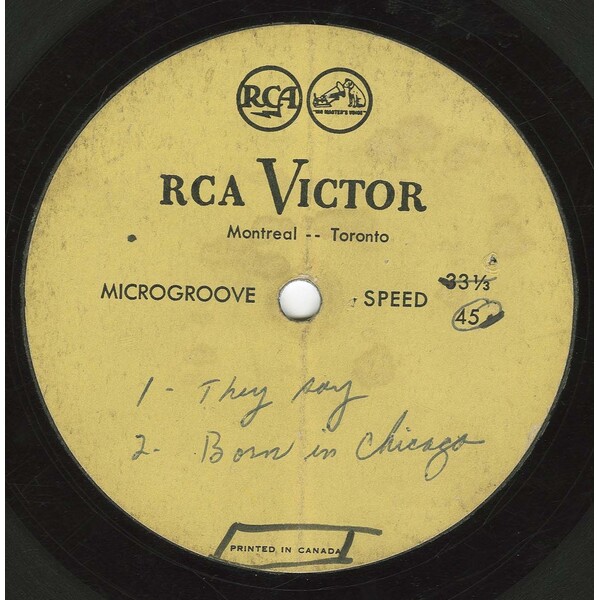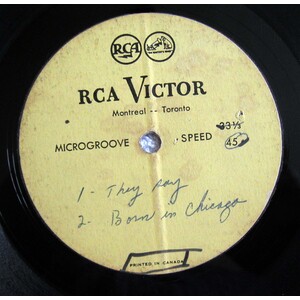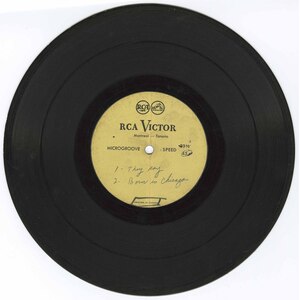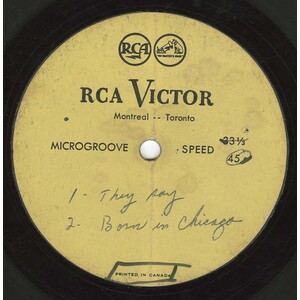Information/Write-up
Les 409: Quebec's Garage Rock Gem
Formed in Pont-Viau, Quebec, in 1963 by Normand Boucher, Les 409 took their name from the Beach Boys’ song "409," penned by Brian Wilson, Gary Usher, and Mike Love. The song was the B-side to "Surfin’ Safari" and captured the youthful energy of the early '60s. With the Denis Pantis-produced single "They Say" b/w "Born in Chicago," Les 409 cemented their place as one of the best garage rock acts of their time—arguably the best in Quebec. "They Say" is a pure long-haired garage anthem, while their punked-out rendition of "Born in Chicago" stands tall even against The Paul Butterfield Blues Band’s version.
Quebec in the 1960s had no shortage of stellar garage bands. The Haunted, Les Sinners, and Les Lutins all recorded solid full-length albums, but when it comes to top garage singles, Les 409 belong in the conversation. Consider the elite list: Les Lutins’ "Je Cherche," Les Sinners’ "Nice Try," Les Fléaux’s "Gloria," and Les 409’s "Born in Chicago" and "They Say." It’s hard to pick a favorite, but no two songs fit together as seamlessly as "They Say" and "Born in Chicago."
"Even though Les 409 recorded in English, people in Quebec still consider them a French band," says Gilles Lefranc, a Montreal record dealer. "I think their music has no language, just feeling. The commercial release is great, but the acetate version is even more raw—it would have been better with a different guitar solo, but it’s what exists."
Lefranc tracked down the only known acetate of a 1966 Les 409 recording—a rougher, slower take rejected by RCA before the band signed with Télédisc. He likely ruffled a few feathers in Quebec by sending this one-of-a-kind artifact to its new home in Calgary, Alberta. He believes this is the only surviving copy, making it one of the rarest Quebec garage records in existence. While the commercial version has fetched as much as $250, this acetate is priceless and deserves recognition on par with the legendary Fringe EP.
This unique acetate will be framed and displayed alongside The Fringe EP at the Museum of Canadian Music. We extend our gratitude to Gilles Lefranc for preserving this remarkable historical find, bridging Canadian and Quebec musical heritage.
The Story of Les 409
Three young students from Pont-Viau—Normand Boucher, Pierre Choquette, and Claude Payette—were members of their local marching band when they decided to form a rock group. In September 1963, they gathered at Boucher’s home and traded brass instruments for electric guitars and drums. Their early influences included The Ventures, a leading American instrumental band, as well as the Beach Boys’ surf and hot rod sound. It was only fitting that they named themselves after the Beach Boys' song "409."
In the spring of 1964, Les 409 underwent their only lineup change when Robert Bertrand left and was replaced by Claude Lévesque. To gain exposure, they secured a three-day gig playing outdoors in a supermarket parking lot in Pont-Viau. Their performances captivated young audiences, drawing them in with their energy and sound. Even a rainstorm on the third day couldn’t stop them from playing—proof of their passion and dedication.
As the mid-’60s progressed, Les 409 had the look and sound of a band poised for success—long hair, mod suits, turtlenecks, and a musical style influenced by The Beatles and The Rolling Stones. Despite their talent and dedication, they, like many other garage bands of the era, never received the recognition they deserved. However, their recordings, particularly "They Say," remain highly sought-after gems among Quebec vinyl collectors, solidifying Les 409’s legacy in Canadian garage rock history.
Thanks to the efforts of dedicated collectors and historians, Les 409’s music and story continue to be celebrated. Their raw energy and rebellious spirit remain an enduring testament to the vibrant Quebec garage rock scene of the 1960s.
-Robert Williston
Museum of Canadian Music
mocm.ca
Normand Boucher: vocals, guitar
Pierre Choquette: bass
Robert Bertrand: rhythm guitar (replaced by Claude Lévesque in 1964)
Claude Payette: drums




No Comments